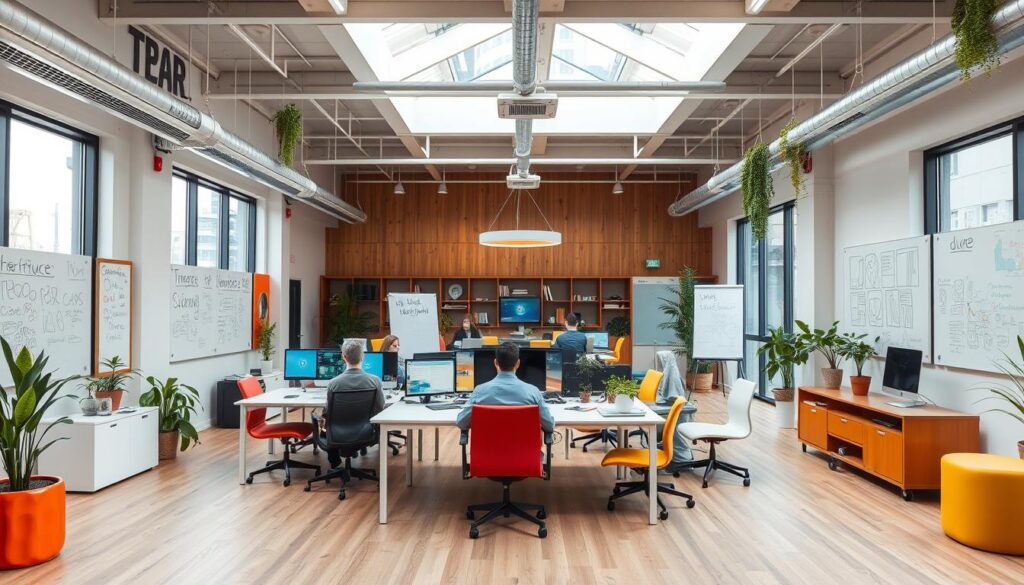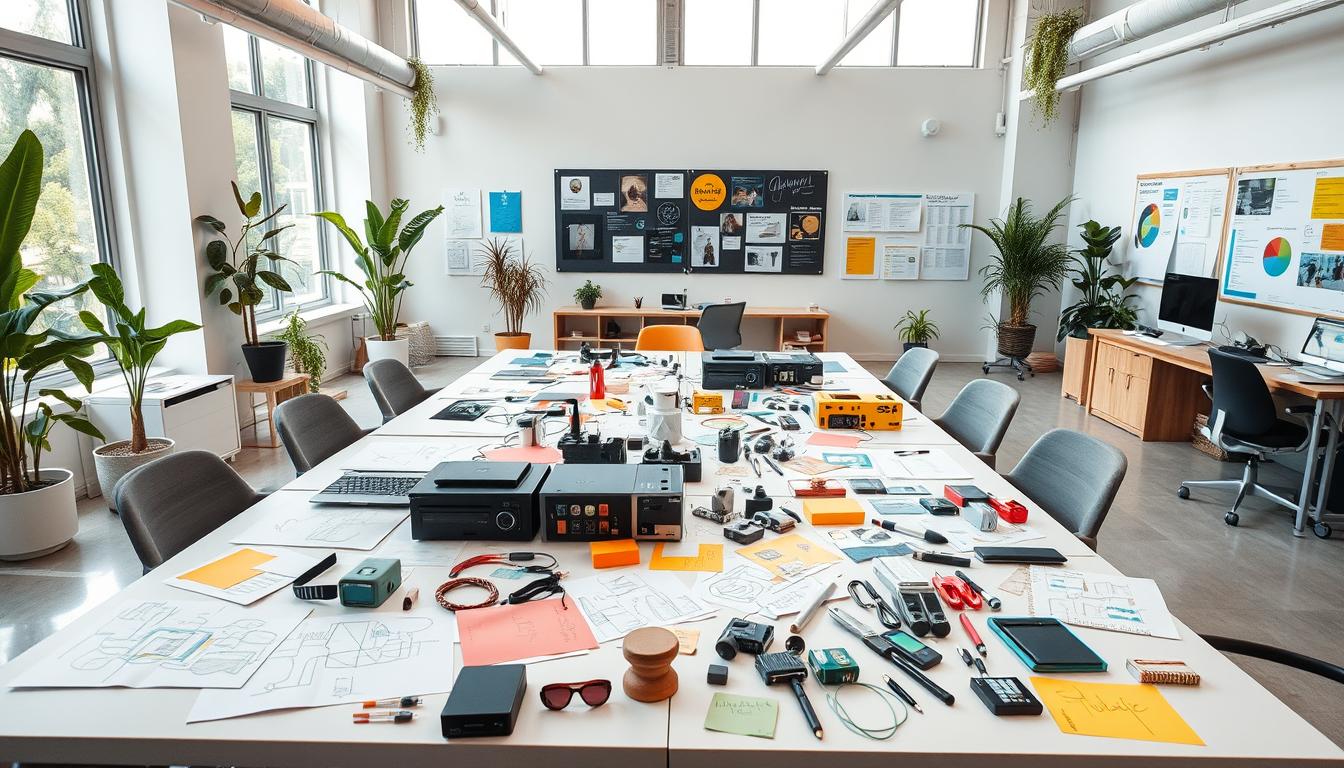“Design is not just what it looks like and feels like. Design is how it works.” – Steve Jobs, Co-founder of Apple Inc.
In today’s fast-changing digital world, human-centered design is key. Top agencies in America are changing how we use technology. They put the user first in their design work.
These forward-thinking groups use new design thinking methods. They aim to make experiences that are easy to use and look great. These experiences connect well with the people they are made for.
Key Takeaways
- Top human-centered design agencies in America are transforming user experiences through innovative solutions.
- These agencies focus on understanding user needs, behaviors, and preferences to create products and services that resonate with target audiences.
- Leading agencies like UX Studio, Clay, IDEO, and MetaLab offer a range of services, including UX/UI design, product strategy, and development.
- They work with global clients across various industries, including tech giants like Google, Netflix, and Amazon.
- Emphasis on user research, prototyping, and iterative design processes to deliver exceptional digital experiences.
Understanding Human-Centered Design
In the world of design, a new approach has come to the forefront – Human-Centered Design. This method puts the user first. It makes sure the product or service is easy to use and feels natural.
Definition and Principles of Human-Centered Design
Human-Centered Design is a way to solve problems by making products that meet user needs. It involves understanding the user, their situation, and feelings. It also includes a cycle of creating ideas, making prototypes, and testing them.
The main principles include involving users, showing empathy, and using Usability Testing. Designers use Empathetic Design to find the real problems. Then, they create solutions that users will love.
Importance in Modern Design Practices
In today’s market, Design Strategy and Human Factors are key. They help make products that users want and that help businesses succeed. Using Human-Centered Design, companies can stay ahead, make customers happy, and keep them coming back.
The move to Human-Centered Design focuses on knowing the user’s world, solving the right problems, and making small changes. This approach has changed the game in modern design.
Criteria for Selecting Top Agencies
Choosing a top human-centered design agency involves several key factors. Expertise in User Experience (UX) and User Interface (UI) design is essential. A diverse portfolio that shows their ability to handle different design challenges is also important.
Industry experience and technological capabilities are crucial. The agency must use the latest Design Thinking and Inclusive Design practices.
Reputation and Client Testimonials
A good reputation and positive client testimonials are key signs of an agency’s success. Look for case studies that show their impact on client businesses. These should include metrics like increased user engagement and customer satisfaction.
User Research is also vital. Leading agencies use deep user insights to make informed design decisions.
“Companies that invest in UX see a return of $100 for every $1 spent.”
Choosing the right human-centered design agency requires a thorough evaluation. Look for expertise in Inclusive Design, technological skills, and a focus on users. This ensures a partnership that meets your business’s unique needs and connects with your audience.
Leading Human-Centered Design Agencies in America
In the world of User Experience (UX) Design, Design Strategy, and Usability Testing, some agencies in America lead the way. IDEO, MetaLab, and Fantasy are top names for their creative work and strong client lists.
Notable Agencies and Their Specialties
IDEO, based in Palo Alto, California, is a pioneer in design thinking. They’ve solved big problems in healthcare and education, always focusing on the user. MetaLab, known for working with tech giants, is great at UI design and product strategy. Fantasy, based in Brooklyn, is a digital product design expert that boosts user experiences in many industries.
Case Studies of Successful Projects
These agencies show their skills in their case studies. IDEO made Airbnb better for hosts, MetaLab revamped Slack’s UI, and Fantasy improved USA Today’s digital site. These examples show how human-centered design leads to innovation and real business wins.
| Agency | Specialties | Successful Projects |
|---|---|---|
| IDEO | Design Thinking, UX Research | Airbnb Host Experience Improvement |
| MetaLab | UI Design, Product Strategy | Slack User Interface Redesign |
| Fantasy | Digital Product Design | USA Today Digital Platform Enhancement |
These top human-centered design agencies in America are all about innovation and better user experiences. They use their special skills and teamwork to achieve real business success.

Trends Influencing Human-Centered Design
The digital world is changing fast. Empathetic Design and Inclusive Design are key in making user experiences better. New tech like artificial intelligence (AI), virtual reality (VR), and voice tech are changing design. They make it more personal and accessible.
Top design agencies are using these new techs to make digital experiences better. They use user research and data to design with users in mind. This ensures digital solutions meet the needs of all users.
Emerging Technologies and Their Impact
AI and machine learning make experiences more intuitive and personal. VR and AR bring users into digital worlds. Voice tech makes interacting with digital products natural and inclusive.
By using these techs, agencies are making design more human-centered. They create experiences that look good and meet user needs.
The Role of User Research in Design
User research is vital in Empathetic Design and Inclusive Design. Agencies use many methods to understand users better. This includes remote testing and AI analytics.
This data helps them design better. They make sure their products meet what users want and expect.
“Human-Centered Design (HCD) focuses on placing the user’s needs and experiences at the core of the design process.”
The digital world keeps changing. New tech and user research are key in shaping design. By following these trends, agencies can make digital experiences that truly connect with users.
How to Collaborate with Design Agencies
Working well with Human-Centered Design agencies means clear communication and involving all stakeholders. It’s also about being open to changing your plans as needed. By following these steps, companies can get the most out of Design Thinking and create digital experiences that really connect with users.
Best Practices for Partnership
Good partnerships start with clear goals, realistic deadlines, and regular updates. Companies need to share user data, join design workshops, and question their own ideas. This way, the final product meets both user needs and business goals.
Maximizing the Benefits of Human-Centered Design
Co-creation sessions, where clients and designers work together, unlock human-centered design’s full power. By embracing change and listening to user feedback, companies can create solutions that truly engage their audience. This approach leads to designs that not only succeed but also drive real business results.



